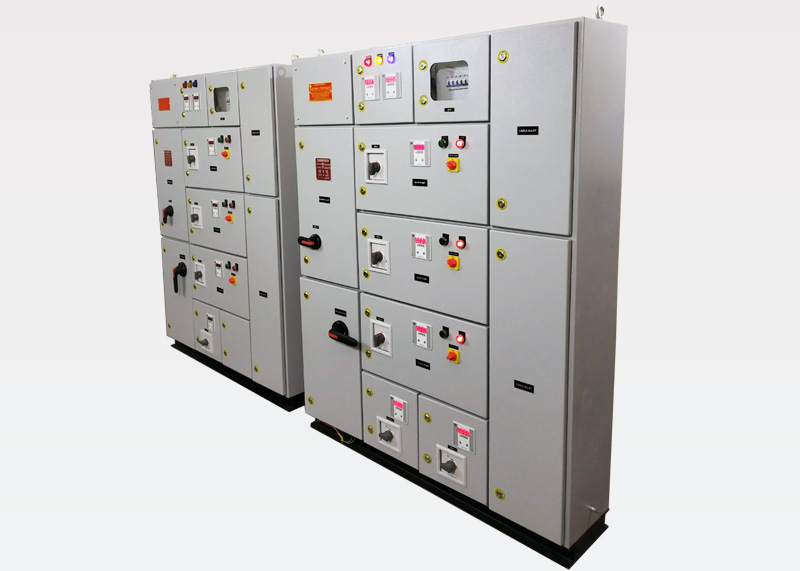Fire Fighting Panels
Motor Control Centers (MCC)
Motor Control Centers are special panel boards controlling all the pumps, motors, heaters, pressure vessels, swimming pool equipments, filtration plants of different Horse Powers. The size of this type of a motor control center / Power control center varies from 3 meters to 10 meters in length.
What is a motor control center?
A motor is a device that uses electrical energy to perform mechanical tasks like rotating a pump, fan, or blower. With the growth of industry, there is an increased need for automating and mechanizing various industrial processes. To achieve this, multiple motors are required and therefore Motor Control Centers (MCCs) are necessary to control them all. The MCC is a large enclosure that houses the main motor control equipment. Inside the MCC, control components can be easily plugged in or unplugged, eliminating the need for wiring. It consists of a busbar and other control equipment that allow for the operation of the motor to be controlled effectively. The MCC also has different motor starting methods such as the DOL and star-delta starter.
Major components in Motor Control Center
- Bus bar
- Circuit breakers
- Relay control
- Contactors
- Control transformer
- Control panel enclosure
- Limit switch
Application of MCC
Motor Starting
It is crucial to start the motor slowly and gradually in order to protect the machine. Operating industrial machines at a high speed from the beginning can potentially cause damage, whereas gradually increasing the speed is more beneficial.
Operational Control
By ensuring the necessary operational speeds and characteristics, this device can safeguard the motor, machine, materials, and operator.
Stopping
The MCC is required to have the ability to promptly halt the motor as there are instances when the machine needs to be stopped swiftly, and this function is fulfilled by the MCC. Emergency stops are necessary for specific industrial machinery.
Reversing
In an industrial process, it is necessary to easily change the direction of the machine rotation. There are situations where a continuous change of direction is required in such processes.
Damage Prevention
The machine should be protected from any damage to avoid costly damages. An example of this would be preventing the pileups in a conveyor caused by the machine. Therefore, the machine must take appropriate measures like reversing, stopping, or slowing down. The MCC should regulate the machine based on the process requirements.
Motor Protection
- Overload
- Over current
- Phase failure
- Phase reversal protection
- Low voltage
- Ground fault protection
Low Voltage Motor Control Center (LV MCC)
Low-voltage motor control centers are commonly employed for three-phase motors with low currents, ranging from 208 V to 600 V.
High Voltage Motor Control Center (HV MCC)
High voltage MCC is utilized for operating large motors within the range of 2300V to 15000V. It employs a vacuum contactor for switching and is equipped with distinct compartments for both switching and power control.
Major components in Motor Control Center
- Bus bar
- Circuit breakers
- Relay control
- Contactors
- Control transformer
- Control panel enclosure
- Limit switch


